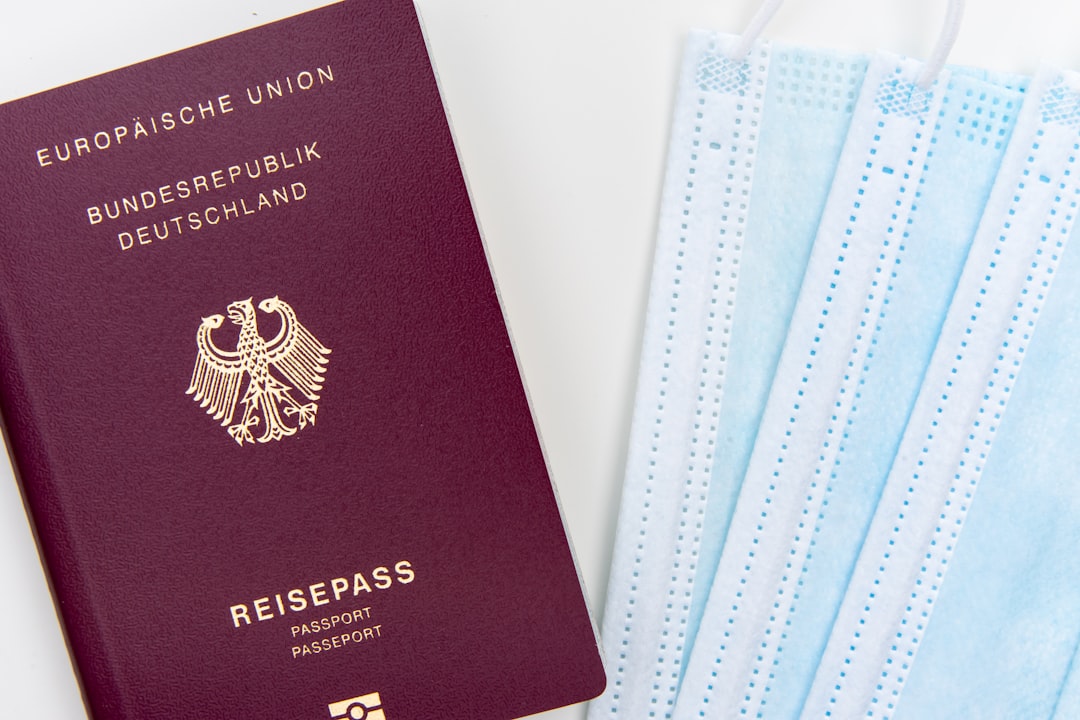Germany Travel Advisories 2025: Essential Safety
Why Understanding Germany Travel Advisories Matters
Germany travel advisories offer vital safety information for trips to this popular European destination. While Germany is largely safe with excellent infrastructure, understanding official guidance helps you travel with confidence. These advisories, issued by government agencies, are updated regularly based on security threats, health risks, and local laws.
Here’s a snapshot of the current situation:
Current Advisory Levels (2025):
- United States: Level 2 – Exercise Increased Caution (due to terrorism)
- Canada: High Degree of Caution (due to terrorism threat)
- Australia: Exercise Normal Safety Precautions
- United Kingdom: No specific advisory level, general precautions advised
Key Concerns:
- Ongoing terrorism threat
- Petty crime in cities and transport hubs
- New biometric border controls (EES) causing potential delays
- Temporary border checks at land crossings until March 2026
Most advisories for Germany highlight the need for general awareness rather than indicating serious danger. The terrorism risk is present across Europe, and petty crime is a common issue in major cities worldwide. This guide will break down what these advisories mean, how to stay safe, and what to do in an emergency, so you can focus on enjoying your trip.
I’m Ramy Saber, founder of GoTravelHunt. My expertise in European travel requirements will help you steer the complexities of planning your German adventure.
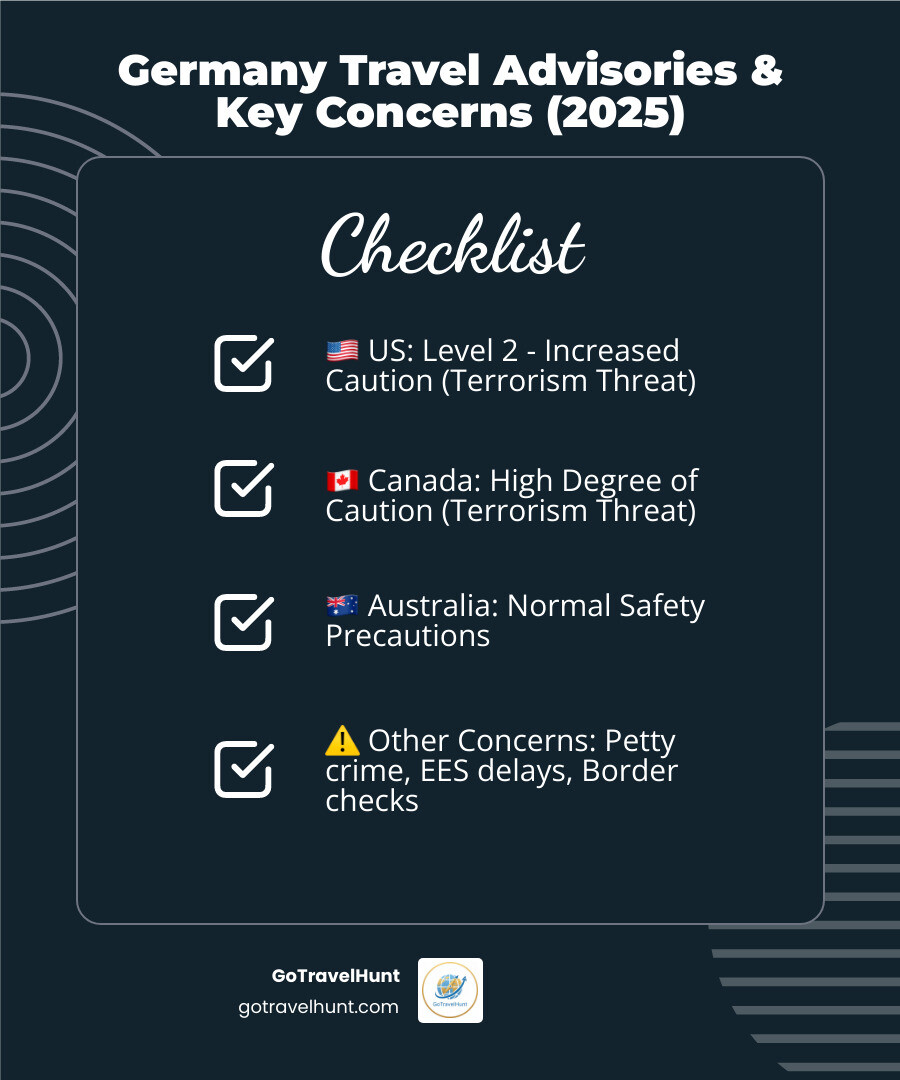
Similar topics to germany travel advisories:
Understanding Official Germany Travel Advisories
Before your trip, check your government’s official travel advisory for Germany. These advisories are designed to keep you safe and informed while abroad.
Most countries use a tiered system to communicate risk. The US Department of State uses a four-level system: Level 1 (Normal Precautions), Level 2 (Increased Caution), Level 3 (Reconsider Travel), and Level 4 (Do Not Travel). Global Affairs Canada and Australian Smartraveller use similar frameworks, while the UK’s Foreign, Commonwealth & Development Office (FCDO) provides detailed country-specific advice without numbered levels.
For US travelers, enrolling in the free Smart Traveler Enrollment Program (STEP) is highly recommended. It provides security alerts and makes it easier for the embassy to contact you in an emergency.
Current Germany Travel Advisories by Country
Here’s what governments are currently saying about travel to Germany:
- The United States has Germany at Level 2 – Exercise Increased Caution. This is primarily due to the ongoing threat of terrorism, which affects much of Europe.
- Canada advises a High Degree of Caution for the same reason.
- Australia maintains its lowest advisory, Exercise Normal Safety Precautions, while still acknowledging the terrorism threat.
The terrorism threat mentioned is real but manageable. Terrorist groups and lone actors could target public spaces like train stations, airports, Christmas markets, and tourist attractions. Attacks may involve various methods, but millions visit Germany safely each year. These advisories are meant to keep you alert, not at home.
How to Stay Updated on Germany Travel Advisories
Situations can change quickly, so staying informed during your trip is crucial.
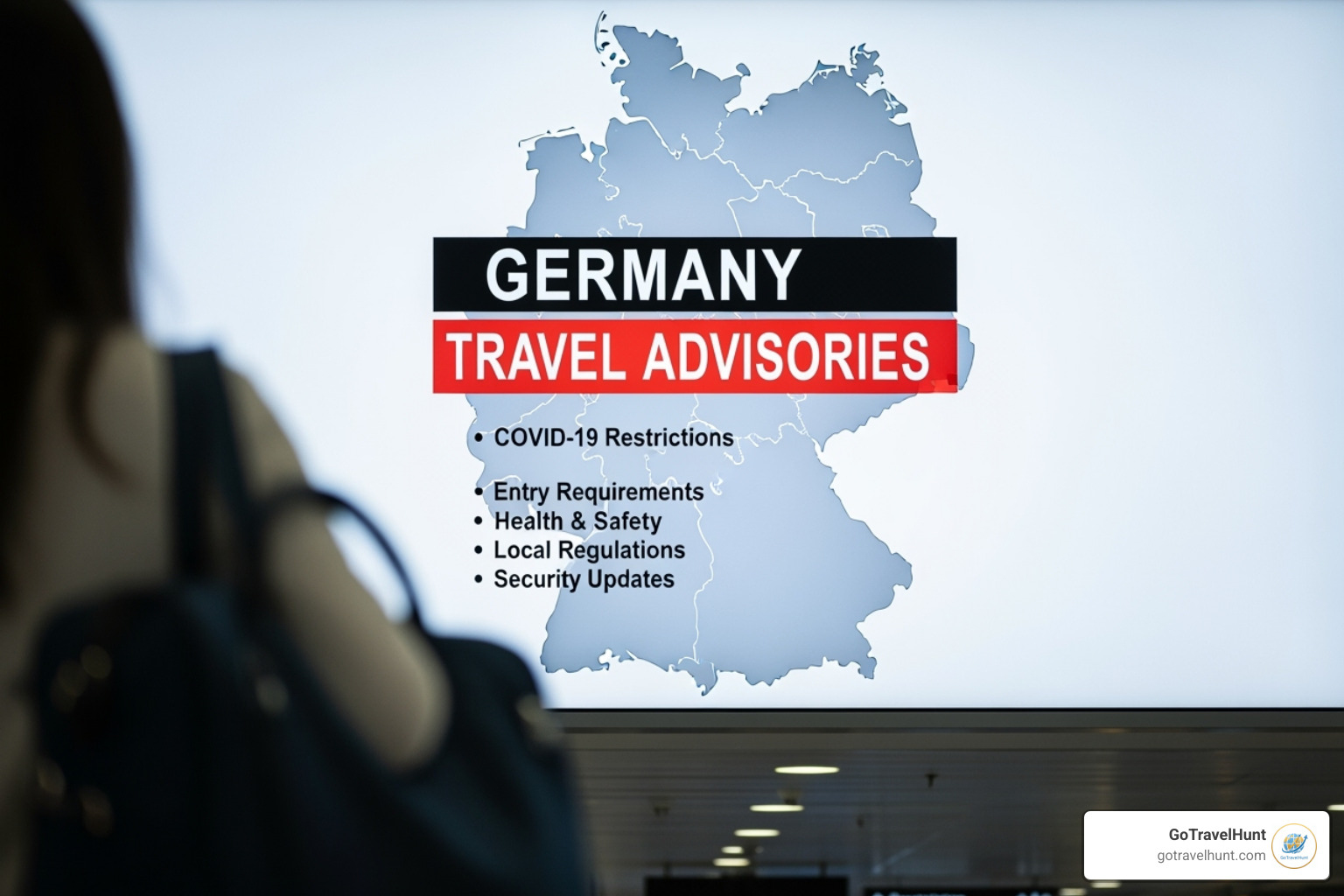
- Government Alert Systems: Besides the US STEP program, Canada and Australia offer similar registration services for travelers.
- Embassy Social Media: Follow your embassy’s social media accounts, like the FCDO travel advice on X, for rapid updates.
- Local News: Monitor German news outlets (many have English versions) for information on demonstrations, strikes, or weather warnings.
- NINA Warning App: Download this free app from Germany’s Federal Office for Civil Protection. It sends official alerts about emergencies, severe weather, and other hazards directly to your phone in English.
Key Safety and Security Concerns
While Germany is one of Europe’s safest countries, it’s wise to be aware of potential challenges.
- Terrorism: The most serious concern noted in Germany travel advisories is the ongoing threat from terrorist groups and lone actors. Attacks have occurred in public spaces like city centers, transportation hubs, and cultural venues. Christmas markets and major events like Oktoberfest see heightened security, but visitors should remain alert.
- Petty Crime: The most common issue for travelers is petty crime. Pickpocketing and bag snatching are prevalent in crowded areas, especially on public transport and at tourist hotspots like Brandenburg Gate. These crimes are largely preventable with basic precautions.
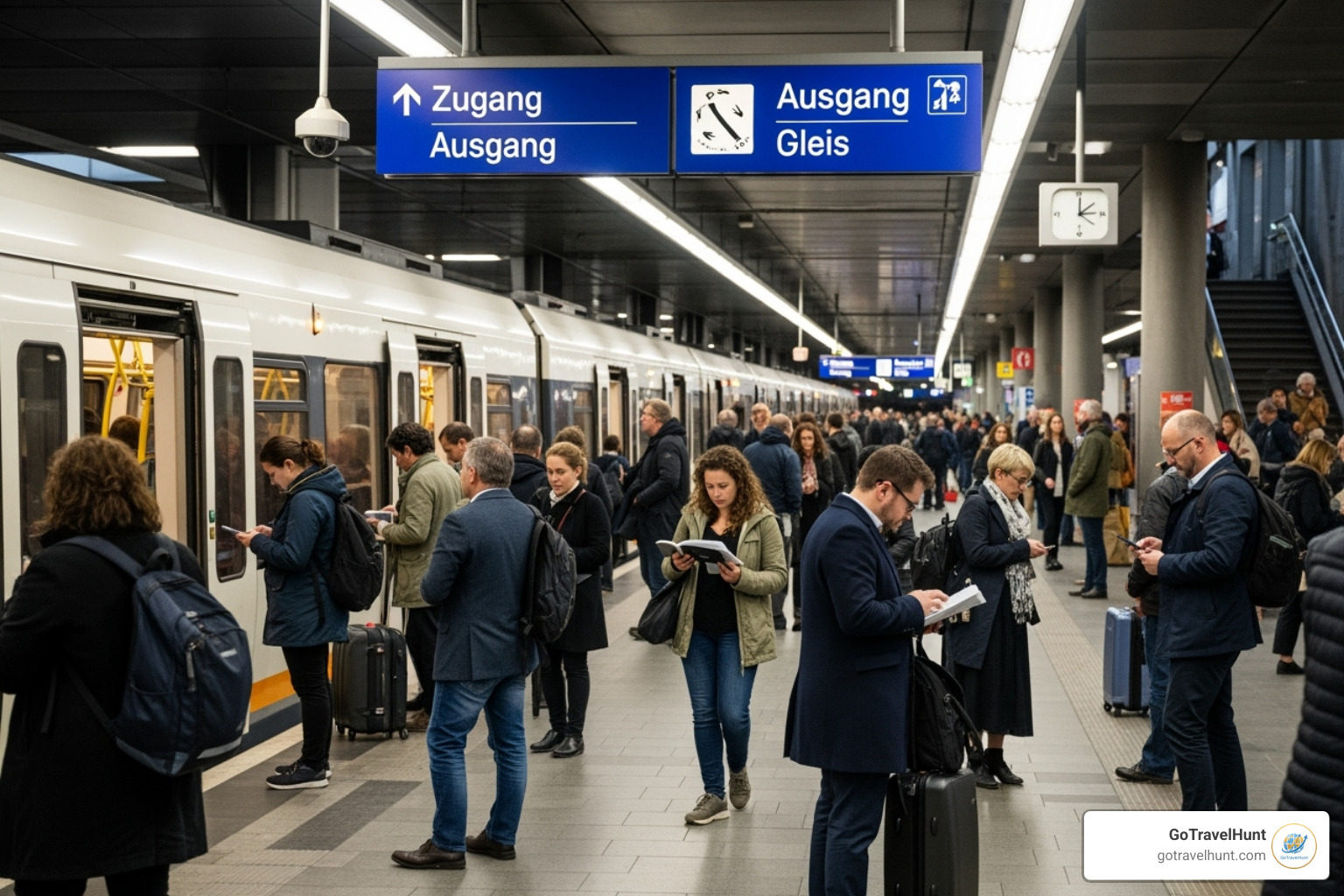
- Demonstrations and Strikes: Peaceful demonstrations are common but can disrupt traffic. Strikes affecting public transport, especially Deutsche Bahn, can also impact travel plans. Check local news to avoid delays.
- Cyber Security: Be cautious when using public Wi-Fi networks in cafes, hotels, and airports, as they are often unsecured. Avoid making purchases or sharing sensitive information on these networks.
Terrorism and Crime Prevention
Staying safe is about being prepared, not fearful. Follow these tips:
- Be Vigilant: Pay attention to your surroundings in public spaces. If a situation feels wrong, leave.
- Report Suspicious Activity: Alert local police or security if you see unattended bags or unusual behavior.
- Secure Your Belongings: Use a money belt or anti-theft bag. Keep valuables in your hotel safe and don’t flash expensive items.
- Be Cautious in Crowds: At major events, stay toward the edges and know your exit routes.
- Prevent Drink Spiking: Never leave your drink unattended or accept drinks from strangers.
For more details, consult the German Federal Ministry of the Interior, Building and Community’s website.
Specific Risks for Travelers
- Women Travelers: Germany is generally safe for solo female travelers. Standard precautions, like being aware of your surroundings at night, are advised.
- LGBTQ+ Travelers: Germany is very progressive, with strong anti-discrimination laws and vibrant LGBTQ+ scenes, especially in Berlin. Some countries may not accept passports with an ‘X’ gender marker for entry or transit.
- Travelers with Disabilities: While social acceptance is high, accessibility can be a challenge in older buildings and outside major cities. Research hotels and transport options in advance. The German National Tourist Board’s accessibility information is a great resource.
- Dual Citizens: If you hold German citizenship, German authorities will consider you a German citizen, which may limit the consular services available from your other country of citizenship.
Navigating Entry, Exit, and Local Laws
Understanding Germany’s entry rules makes for a smooth arrival. As part of the Schengen Area, Germany allows visa-free travel for many visitors.
Travelers from the US, Canada, and Australia can stay in the Schengen Area for up to 90 days within any 180-day period without a visa for tourism. This limit is cumulative across all 27 Schengen countries. Overstaying can result in fines or future travel bans. Ensure your passport is valid for at least three months beyond your planned departure from the Schengen Area; six months is recommended.
If you plan to work, study, or stay longer than 90 days, you must apply for the appropriate visa before you travel. For more trip-planning help, see our travel planning guides.
New Border Controls: EES and Temporary Checks
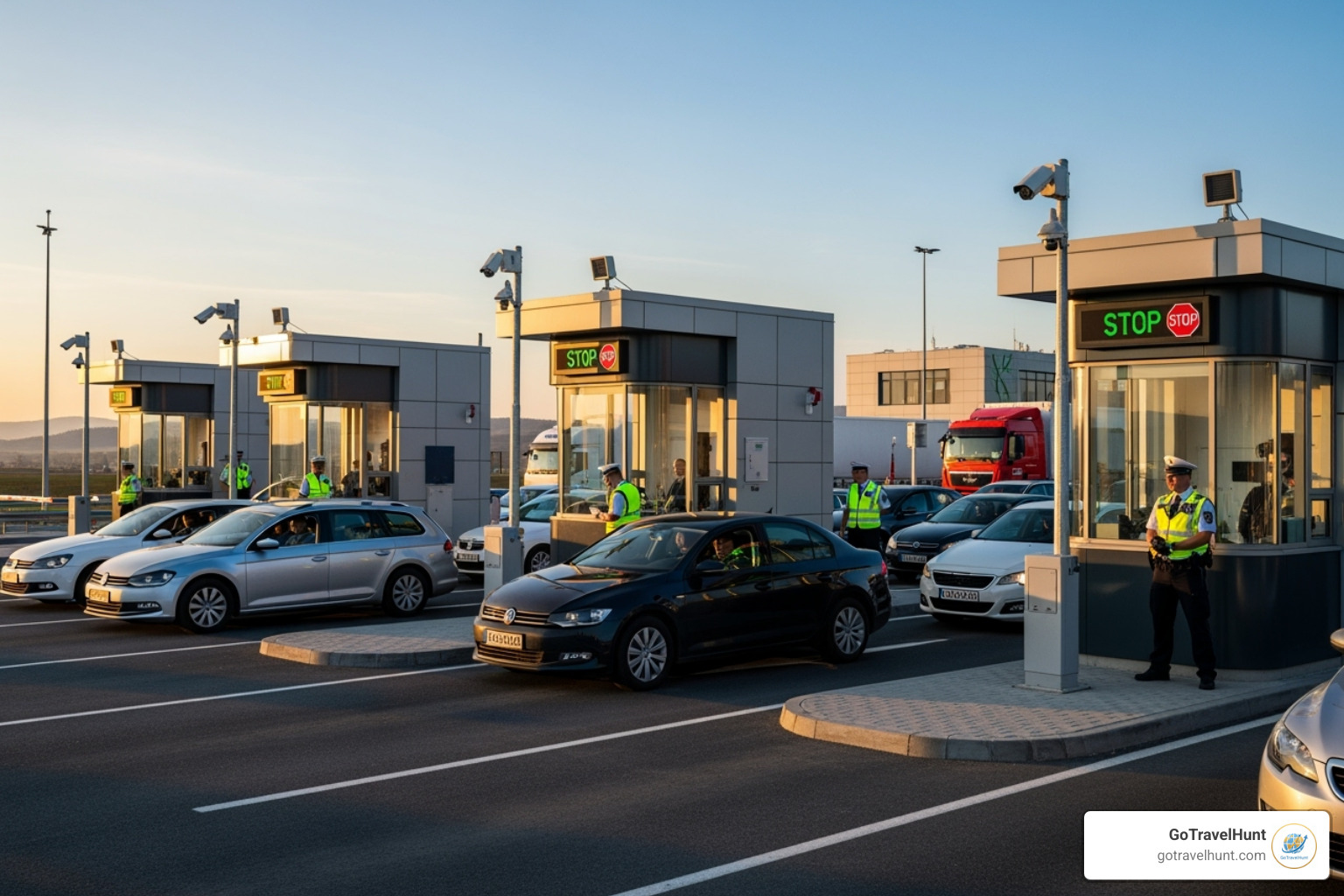
European border procedures are changing. Here’s what to expect:
- European Entry/Exit System (EES): This upcoming automated system will register non-EU travelers by collecting biometric data (fingerprints and a photo) upon first entry. This digital record is valid for three years. The EES is expected to be operational by October 2025. Expect potential delays at borders during the initial rollout. Check the Official EES Information for updates.
- Temporary Land Border Checks: Germany has implemented temporary checks at its land borders until at least March 15, 2026. Always carry your passport when crossing borders within Europe, even within the Schengen Area.
Essential Local Laws and Cultural Norms
Familiarize yourself with local laws to avoid trouble:
- Carry Photo ID: You are required to carry a valid photo ID (like your passport) at all times.
- Drug Penalties: Penalties for possessing even small amounts of illegal drugs are severe.
- Ban on Nazi Symbols: It is a serious criminal offense to display, use, or possess Nazi symbols, salutes, or propaganda. This law is strictly enforced, and violations lead to severe penalties. Do not make gestures that could be misinterpreted, even as a joke.
- Customs Regulations: You must declare cash or equivalent monetary instruments exceeding 10,000 Euros when entering or leaving Germany from a non-EU country. See the EU Cash Controls for details.
Health, Environment, and Emergency Preparedness
Germany offers high standards of safety and healthcare, but it’s always wise to be prepared.
Germany’s medical care and facilities are excellent, but providers often expect upfront payment or proof of insurance. Comprehensive European travel insurance is essential to cover potential costs, including medical evacuation.
Regarding natural disasters, be aware of regional risks. Heavy rains can cause flooding, summers may bring wildfires, and mountainous areas face avalanche risks in winter. Download the NINA warning app for official alerts and monitor local weather forecasts.
For hiking or skiing, always check conditions, inform someone of your plans, and never go into remote areas alone. For winter sports, consult avalanche forecasting and warnings.
Health Risks and Vaccinations
No specific vaccinations are required for entry into Germany. However, ensure your routine vaccinations (tetanus, measles, etc.) are up-to-date. A flu shot is also a good idea for winter travel.
- Tick-borne encephalitis (TBE): This viral infection is a risk in forested areas of southern Germany (especially Bavaria and Baden-Württemberg) from spring to autumn. Discuss vaccination with your doctor if you plan extensive outdoor activities there. The World Health Organization provides detailed information on TBE.
- Insect Bites: Use insect repellent and wear protective clothing when outdoors to prevent tick and other insect bites. Check for ticks after hiking.
- Food and Water: Tap water is safe to drink, and food hygiene standards are high.
Bringing Medication into Germany
Always carry prescription medication in its original packaging with a copy of your doctor’s prescription. For controlled substances (e.g., strong painkillers, some ADHD medications), you are generally limited to a 30-day supply and require a special certification from your doctor. Verify specific requirements with the German Federal Institute for Drugs and Medical Devices before your trip to avoid confiscation.
Emergency Contacts and Consular Assistance
Save these numbers in your phone:
- 112: Fire and Medical/Ambulance
- 110: Police
For consular assistance (e.g., lost passport, arrest), contact your country’s embassy or consulate. They can provide emergency travel documents, lists of local lawyers/doctors, and support for victims of crime, but they cannot pay fines or get you out of jail.
- US Citizens: U.S. Embassy Berlin (+49-30-8305-0) or consulates in Frankfurt and Munich.
- Canadian Citizens: Embassy of Canada in Berlin (+49 (30) 20312 470) or consulates in Düsseldorf and Munich.
- Australian Citizens: Australian Embassy in Berlin (+49 30 880088 0) or Consulate-General in Frankfurt.
Transportation and Driving in Germany
Germany’s efficient transportation network makes getting around easy and enjoyable.
The public transport system is world-class. Deutsche Bahn (DB) operates a reliable and extensive network of trains, including high-speed ICE services connecting major cities. Cities feature integrated systems of buses, streetcars, and subways (U-Bahn/S-Bahn). Be aware that strikes affecting public transport can occur, sometimes with little notice, so check local news or the DB website for updates.
Road safety standards are high, and roads are well-maintained. However, foreign drivers should familiarize themselves with local traffic laws to prevent accidents.
Driving Regulations and Requirements
If you plan to drive, ensure you meet these requirements:
- International Driving Permit (IDP): While your home license may be valid for short stays, an IDP is highly recommended to avoid any issues with local authorities.
- Speed Limits: The famous Autobahn has sections without a general speed limit, but an advisory speed of 130 km/h (80 mph) applies. Many sections have posted limits, which are strictly enforced, as are limits on all other roads.
- Low-Emission Zones (Umweltzone): Many cities require vehicles to display an environmental sticker (Umweltplakette) to enter these zones. Purchase one online or at a service station before entering a city.
- Required Equipment: Your vehicle must contain a first-aid kit, a warning triangle, and high-visibility vests.
- Winter Tires: Between October and Easter, or in any winter conditions, vehicles must be equipped with winter or all-season tires.
Frequently Asked Questions about Germany Travel Advisories
Here are concise answers to common questions about traveling to Germany.
Is it safe to travel to Germany right now?
Yes, Germany is a safe destination for most travelers. While advisories from countries like the US and Canada mention a terrorism threat, this calls for increased awareness, not cancellation of plans. The most likely issue you’ll face is petty crime, which is preventable with standard precautions. Violent crime against tourists is rare. By staying informed and alert, you can have a safe and enjoyable trip.
Do I need a visa to visit Germany as a tourist?
No, a visa is not required for tourist stays of up to 90 days if you are a citizen of the United States, Canada, or Australia. This rule applies to the entire Schengen Area, and the 90-day limit is cumulative across all member countries within a 180-day period. For longer stays, work, or study, you must apply for the appropriate visa before you travel. Also, ensure your passport is valid for at least three months beyond your planned departure.
What should I do if I lose my passport in Germany?
Losing a passport is stressful, but there’s a clear process to follow:
- Report the loss to the local police immediately. Get a copy of the police report, as you will need it for your embassy and insurance.
- Contact your country’s embassy or consulate. They can issue an emergency travel document or a replacement passport. The contact numbers are listed earlier in this guide.
- Use your backups. Having digital or physical copies of your passport and other important documents will significantly speed up the replacement process. Always prepare these before you travel.
Conclusion
You are now equipped with the knowledge to confidently explore Germany. While Germany travel advisories highlight concerns like terrorism and petty crime, millions of people visit safely every year. Preparation is the key to a successful trip.
This guide has explained what advisory levels mean, offered practical safety tips, demystified new border controls, and outlined important local laws and health information. By staying informed with tools like the NINA app and following official guidance, you can travel with peace of mind.
Germany’s excellent infrastructure and welcoming culture make it a fantastic destination. At GoTravelHunt, our goal is to make your travel planning stress-free by providing honest, practical information. When you understand the risks and how to manage them, you can focus on creating unforgettable memories.
Ready to start planning? Explore our comprehensive travel resources and turn your German dreams into reality. Safe travels!

